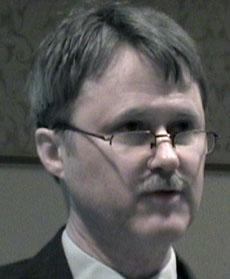When violent incidents such as the shooting of Arizona Congresswoman Gabrielle Giffords and others occur, many people wonder what caused the violence. Some leading researchers say mental illness is not necessarily connected to violence.
It is often the first question that one hears when a violent incident such as the Arizona shootings occurs: Why? And the second question is often about the perpetrator: Is he or she mentally ill?
John Monahan is a psychologist with the University of Virginia's law school. He told VOA there are several factors that cause violence, but mental illness is not necessarily a contributor.

"It is the case that there is a relationship between mental illness and violence but the relationship is not strong and it is heavily related to whether the mentally ill individual is also abusing alcohol or other drugs, says Monahan.
"People with a major mental illness such as schizophrenia or manic depression, if they are not also on drugs or alcohol - and in particular if they are in mental health treatment - have no higher rates of violence than do their non-disordered neighbors."
The accused shooter in Arizona, Jared Lee Loughner, has not been diagnosed with a mental illness, but news reports have quoted some of Loughner's friends as describing erratic behavior, marijuana use, and unexplained outbursts in class.
Loughner's own writings posted on the Internet have spoken of his beliefs that the government was controlling a secret currency, controlling his mind and even controlling the words that make up language.
Police have found notes in his room that say such things as "I planned ahead" and "my assassination."
Some of his behavior mirrors some of the symptoms of schizophrenia, but it should be stressed that he has not been diagnosed with that disorder.

Dr. Marvin Swartz is a leading researcher specializing in mental illness and violence at Duke University. He says predicting violent outbursts is difficult, but there are risk factors for violent behavior.
"Predicting this kind of level of extreme violence and very tragic violence is very hard to do because it is so rare, he says, "but in general there are some risk factors for violence among folks with serious mental illness and they include things like substance use, not being in treatment, not adhering with treatment.
Dr. Swartz says there also are environmental factors, particularly if people live in environments that are very disorganized, "essentially poor neighborhoods where there is a lot ambient crime and substance abuse – all those are risk factors for violence."

Dr. Jeffrey Swanson is a social scientist who studies mental illness and violence in populations. He says distorted thinking does not necessarily indicate a propensity to violence.
"So the thought disorder is essentialy a distortion of the normal thinking. Something that might be perceived as normal fright or an excessive fright. Someone with distorted thinking might responde accordingly. The question of whether someone is mentally ill or has distorted thinking should be separated from the question of whether they are likely to commit a violent act because they may or may not. Lots of people who are mentally ill never commit violent acts." says Swanson.
All three of the researchers contacted for this report said substance abuse is a big factor in violent behavior. All of them said that mental illness coupled with substance abuse can trigger violent episodes.
But Dr. Swartz stressed that a very small percentage of those diagnosed with mental illness ever commit violent acts.
"I think that it's also important to recognize that very little violence in society is attributable to mental illness and that folks who have mental illnesses and are afforded good treatment generally really do not have an elevated risk of violence."
None of those contacted for this report saw a direct connection between political rhetoric and violent outbursts. All three researchers said that predicting which individuals would become violent is extremely difficult.

Officials at Pima Community College, where the alleged shooter in Arizona, Jared Lee Loughner, attended classes, told his parents he could only return to class if he underwent a mental health evaluation. Loughner did not have the evaluation and did not return to class.
No one in his circle, his friends, teachers or his parents asked for a court-appointed counselor to interview Loughner.
News reports quoting his friends and classmates say he had a strained relationship with his parents and that he had difficulty holding a job.
It is not clear whether mental health treatment would have prevented the shootings in Tucson, but the researchers contacted for this report say getting treatment is a key element in preventing violent behavior. Sunstantial budget reduction of community health programs including mental health clinics could make it more difficult for those struggling with mental illness to find help.
perpetrator: a person who commits a crime or does something that is wrong or evil 作恶者;行凶者;犯罪者
schizophrenia: a mental illness in which a person becomes unable to link thought, emotion and behaviour, leading to withdrawal from reality and personal relationships 精神分裂症
marijuana: a drug (illegal in many countries) made from the dried leaves and flowers of the hemp plant; it gives a feeling of being relaxed when it is smoked 大麻;大麻毒品
Obama to speak at Arizona memorial service
Suspected US assassin to show in court
US lawmaker injured in shooting, 6 others killed
Arizona congresswoman Gabrielle Giffords shot at public event
(来源:VOA 编辑:崔旭燕)
